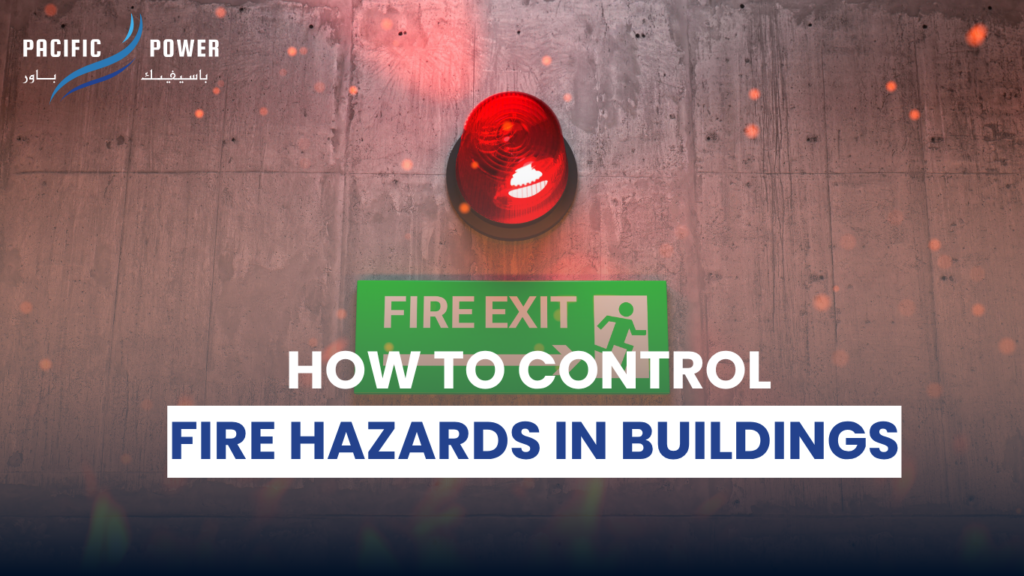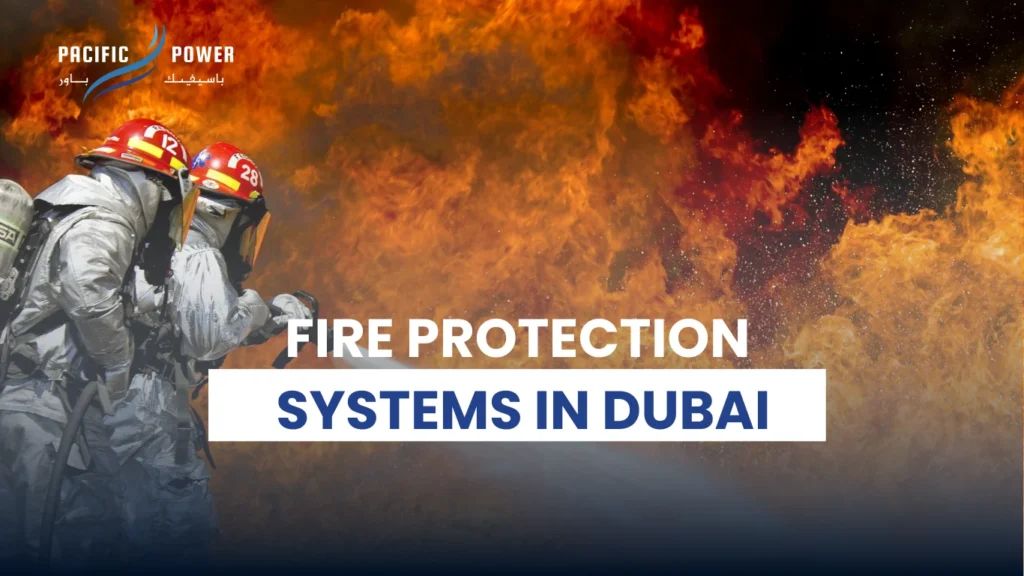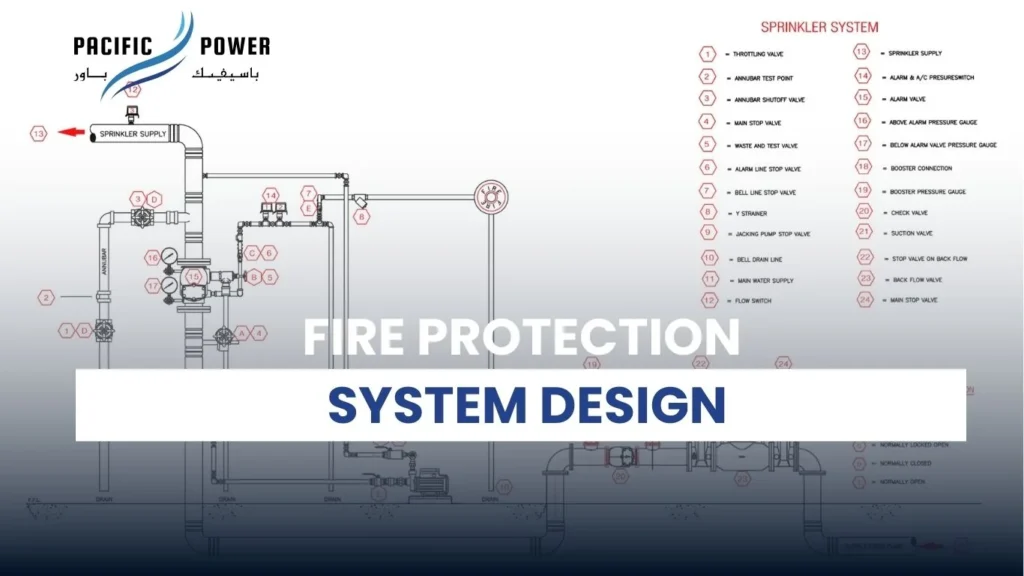
Table of Contents
Top 10 Common Fire Hazards in Buildings and How to Prevent Them
Fire safety is a critical concern in Dubai, where growing commercial hubs, and dense residential areas demand fire protection. The UAE Fire and Life Safety Code, enforced by Dubai Civil Defence, underscores the importance of identifying and mitigating fire hazards to protect lives and property.
Fire safety systems play a pivotal role in this effort, combining detection, suppression, and prevention technologies to ensure safety. This comprehensive guide explores the common fire hazards in buildings and provides practical, Dubai-specific prevention strategies to help property owners, facility managers, and residents create safer environments.
1. Electrical Faults and Overloaded Circuits
Hazard: Electrical faults, such as faulty wiring or overloaded circuits, are a leading cause of fires in Dubai’s buildings. High-rise towers and commercial spaces often rely on complex electrical systems, and issues like frayed wires or outdated panels can spark fires.
Prevention: Regularly inspect electrical systems by certified electricians to ensure compliance with Dubai Civil Defence standards. Use fire safety systems like the Honeywell Notifier FAPT-851 multi-sensor detector to detect smoke or heat from electrical faults early. Avoid overloading outlets, use surge protectors, and replace old wiring. A Dubai Civil Defence approved contractor, offers electrical safety audits to identify risks and ensure compliance.
Why It’s Helpful: Proactive electrical maintenance prevents fires and ensures your building meets regulatory requirements, reducing risks and insurance costs.
2. Cooking Equipment in Kitchens
Hazard: Cooking appliances, especially in residential apartments and restaurant kitchens in Dubai Marina or Downtown Dubai, pose significant fire risks. Grease fires from stovetops or unattended cooking are common culprits.
Prevention: Install fire suppression systems, such as wet chemical extinguishers, in kitchen areas. Use multi-sensor detectors like the System Sensor 4WT-B to detect smoke and CO from cooking fires. Never leave cooking unattended, keep flammable items like towels away from stoves, and clean grease buildup regularly.
Why It’s Helpful: Proper kitchen fire safety measures protect residents and staff, minimizing the risk of fast-spreading grease fires.
3. Flammable Materials Storage
Hazard: Improper storage of flammable materials, such as chemicals or cleaning supplies, is a major hazard in Dubai’s industrial areas like Jebel Ali or commercial buildings with maintenance rooms.
Prevention: Store flammable materials in fire-rated cabinets and designated areas, following NFPA standards. Install fire detection systems like the Bosch FAP-440-DOTC to monitor storage rooms for fire signatures. Conduct regular inventories to remove expired or unnecessary materials. Fire protection services in Jebel Ali offers fire risk assessments to ensure storage complies with Dubai Civil Defence guidelines.
Why It’s Helpful: Safe storage practices reduce the likelihood of fires, protecting workers and assets in high-risk areas.
4. Smoking and Improper Disposal
Hazard: Cigarettes or shisha, if not properly extinguished, can ignite fires, especially in residential balconies or outdoor areas in Dubai’s high-rise buildings.
Prevention: Enforce no-smoking policies in indoor areas and provide designated smoking zones with fire-safe ashtrays. Install smoke detectors like the Apollo Discovery Multi-Sensor Detector in common areas to detect smoldering fires. Educate residents on proper disposal of smoking materials. Our training programs include fire safety awareness for smoking-related risks.
Why It’s Helpful: Clear policies and detection systems prevent fires from careless smoking, enhancing safety in shared spaces.
5. Heating Equipment Malfunctions
Hazard: Portable heaters or HVAC systems, common in Dubai’s cooler months, can cause fires if they overheat or are placed near flammable items like curtains.
Prevention: Use heaters with automatic shut-off features and keep them at least one meter from flammable materials. Install thermal detectors, such as those in the Bosch FAP-440-DOTC, to monitor temperature spikes. Schedule regular Fire maintenance with certified providers to ensure systems meet Dubai Civil Defence standards.
Why It’s Helpful: Proper heater use and maintenance prevent fires, ensuring safe heating in residential and commercial spaces.
6. Faulty Fire Safety Systems
Hazard: Malfunctioning fire safety systems, such as outdated detectors or sprinklers, can fail to detect or suppress fires, increasing risks in Dubai’s high-occupancy buildings.
Prevention: Schedule annual maintenance for fire safety systems, including detectors like the Honeywell Notifier FAPT-851 and sprinkler systems, as mandated by Dubai Civil Defence. Test alarms and replace batteries in devices like the System Sensor 4WT-B regularly. Pacific Power UAE offers maintenance contracts to ensure systems remain functional and compliant.
Why It’s Helpful: Regular maintenance ensures your fire safety systems are reliable, providing peace of mind and regulatory compliance.
7. Clutter and Blocked Exits
Hazard: Cluttered spaces or blocked emergency exits, common in storage areas or busy commercial buildings like those in Deira, hinder evacuation and fuel fires.
Prevention: Keep corridors and exits clear, ensuring compliance with Dubai Civil Defence’s evacuation standards. Install emergency lighting and signage to guide occupants during fires. Use fire detection systems like the Apollo Discovery to monitor cluttered areas. Regular inspections can identify and address clutter-related risks.
Why It’s Helpful: Clear exits and early detection ensure safe evacuations, reducing the risk of injury during emergencies.
8. Arson and Intentional Fires
Hazard: Arson, though less common, poses a threat in public or commercial spaces in Dubai, where high-value properties are targets.
Prevention: Integrate fire safety systems with security measures, such as CCTV and access control, to deter arson. Install addressable fire alarms like Honeywell’s to pinpoint fire origins. Conduct security training to educate staff on identifying suspicious behavior. Ensure fire suppression systems, like FM-200, are installed in vulnerable areas.
Why It’s Helpful: Combining fire and security systems deters arson and ensures rapid response, protecting property and occupants.
9. Inadequate Fire Safety Training
Hazard: Lack of fire safety training leaves occupants unprepared to respond to fires, increasing risks in Dubai’s high-rise towers and crowded malls.
Prevention: Enroll in fire safety training programs, which cover evacuation drills, extinguisher use, and system operation. Install user-friendly fire alarms like the System Sensor 4WT-B to ensure clear alerts. Regularly update training to reflect building changes, aligning with NFPA standards.
Why It’s Helpful: Training empowers occupants to act swiftly, complementing fire safety systems and saving lives.
10. Gas Leaks and Explosions
Hazard: Gas leaks, common in residential kitchens or industrial facilities in Dubai, can lead to fires or explosions if undetected.
Prevention: Install gas detectors integrated with fire safety systems, such as the Bosch FAP-440-DOTC, to monitor for leaks. Ensure proper ventilation in gas-prone areas and schedule regular maintenance for gas appliances.
Why It’s Helpful: Early gas detection prevents catastrophic fires, ensuring safety in homes and workplaces.
Conclusion
Fire hazards in Dubai buildings, from electrical faults to gas leaks, pose significant risks, but robust fire safety systems and proactive prevention strategies can mitigate them. By installing advanced detectors, conducting regular maintenance, and partnering with Dubai Civil Defence approved fire contractor like Pacific Power UAE, property owners can ensure compliance and safety.

